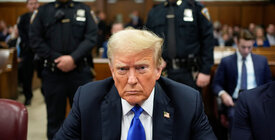Manhattan District Attorney Alvin Bragg has done what many people thought was impossible: obtain the first conviction of a former president. After weeks of testimony and more than nine hours of deliberations, the jury returned guilty verdicts against Donald Trump on all 34 felony counts of falsifying business records. Special Counsel Jack Smith still has two pending indictments against Trump — one for election interference in federal court in the District of Columbia and the other for mishandling classified information in the Southern District of Florida. What can Smith take away from Bragg’s success?
The most important lesson is that no one, Donald Trump included, is beyond the reach of the law.
That’s a cherished American legal tenet, stemming from the founding fathers’ commitment to creating a country in which no one could be above the law. But a mythology developed around Trump that the courts couldn’t hold him to account like other people and that he couldn’t be brought to justice. That’s a dangerous development for any democracy, let alone when it’s a story told about a wealthy businessman who becomes a powerful elected official.
Trump provided the fodder for his own legend, embellishing his “successes.” He tangled up civil cases against him in delay for years, starting with the housing discrimination case the Justice Department brought against him and his father in the early 1970s, alleging they systematically refused to rent any of the 14,000 apartments they managed in Queens to Black applicants. The Trumps hired notoriously aggressive lawyer Roy Cohn to represent them, and they were ultimately permitted to settle without acknowledging liability.
During the 2016 campaign, Trump seemingly reveled in his status as a frequent litigant with a reputation for stalling cases in court, tweeting, “Wow, USA Today did todays cover story on my record in lawsuits. Verdict: 450 wins, 38 losses. Isn’t that what you want for your president?” More recently, Trump ducked indictment in the 2022 criminal tax fraud case the Manhattan district attorney brought against his company and his longtime Chief Financial Officer Allen Weisselberg. They were convicted, but Trump skated.
As for the four criminal cases brought against him by state and federal prosecutors, Trump has dismissed them as meritless political witch hunts, without acknowledging that grand juries voted to indict and that it would ultimately be up to juries to decide whether to convict him. He has mired three of the four in endless delays. Whether it’s a former president, a Supreme Court justice, or anyone else, the notion that the rules don’t apply to some people is inconsistent with fundamental democratic principles.
The myth of Trump’s Teflon-coated invincibility in court began to break down publicly when E. Jean Carroll won two victories against him on defamation charges and a jury found, under the civil preponderance of the evidence standard, that she was telling the truth when she said Trump sexually assaulted her. More than anything else about those cases, people seemed surprised that the rule of law could apply to Donald Trump. That’s how successful the myth created around him had become.
Alvin Bragg never cared about the myth. Instead, his team kept their heads down and focused on the law, not politics. When their case was criticized as being weak or unimportant, they continued to work. They did not let a political narrative drive the prosecution; they did not let Trump’s efforts to try the case outside of the courtroom and demonize it as a politicization of the criminal justice system run them off. The conviction they obtained exposed the idea that had become popular in public culture — that Trump always escapes accountability — for the fallacy that it is.
Now it’s up to Jack Smith and his team to pick up that torch and run the last leg of the race to defeat Trump’s myth of invincibility. Our democratic institutions only work when the public has confidence in them, and permitting the notion that a former president — of all people — is immune from the law to percolate through our society does untold damage to the rule of law. Smith needs to be in tune with that as he conducts his cases. It’s all too easy for the public to blur prosecutors’ obligations to respect defendants’ rights into a belief that there is excessive accommodation and status afforded to the former president turned defendant. Even though Smith can only speak through his pleadings and in court, he must be careful to do nothing that perpetuates a myth that damages democracy.
Trump is entitled to the same rights as all defendants, and his lawyers should, and in fact are obligated to, give him a vigorous defense. But prosecutors should not acquiesce to unnecessary delays or frivolous arguments. They should aggressively identify them as such in their arguments to the court, and they must be clear in distinguishing between legitimate defense moves they disagree with and meritless moves designed to perpetuate Trump’s fiction that the law can’t touch him. Now is the time for Smith to renew his full-court press on every front that is available to him. This suggestion is in no way critical of Smith, whose team has performed admirably despite severe challenges. But this moment, following Trump’s conviction in Manhattan, is the moment to emphasize that Trump, like every other defendant, must answer to the law.
A current or former president receives enormous deference from the Justice Department when it comes to a criminal investigation, starting with the policy of the Office of Legal Counsel that prohibits prosecuting a sitting president. But that doesn’t mean they should be free of consequences for wrongdoing. As Special Counsel Robert Mueller pointed out in his probe of the 2016 Trump campaign’s ties with Russia, presidents are not protected from an investigation into criminal conduct since the findings may inform Congress’s work or be set aside for the day when prosecution is appropriate. And despite Trump’s request that former FBI Director Jim Comey pledge loyalty to him, presidents aren’t entitled to personal loyalty from executive branch employees and other government workers at the expense of the Constitution. No president should have a Roy Cohn.
It’s a dangerous precedent for a country to set.
When Jack Smith indicted Donald Trump for the first time in the classified documents case, his brief public statement declared, “We have one set of laws in this country, and they apply to everyone. Applying those laws. Collecting facts. That’s what determines the outcome of an investigation. Nothing more. Nothing less.” But since that time, his cases have been plagued by a series of unfortunate events. His election interference case is being stymied by a Supreme Court that is taking considerable time to determine whether a president really can, as Trump alleges, order SEAL Team Six to take out a political rival with impunity. And his classified documents case has been put on hold by a district judge who seems to struggle with simple motions and basic requests like setting a trial date.
The delays in the Florida case have done much to perpetuate this notion that Trump can escape the grasp of the legal system. While the special counsel could have made an early attempt at convincing Judge Aileen Cannon to recuse from the Mar-a-Lago case based on her previous mishandling of matters related to the search warrant, his office decided against pursuing that rarely sought remedy in an effort to move the case forward expeditiously. It’s easy to understand Jack Smith’s urge to defer. It’s consistent with the long-standing and entirely appropriate practice of the Justice Department to avoid taking any steps in a prosecution that might seem political.
But the jury’s verdict in Manhattan shows that the people benefit when prosecutors pursue their mission, not out of vindictiveness or animus toward an individual defendant, but with the purpose of seeking the truth and giving the public access to it. Prosecutors in Manhattan aggressively pursued an unusual but appropriate legal theory, refusing to cede any more territory than necessary to Trump when it came to matters like introducing evidence of other crimes or bad acts committed by the defendant or pursuing enforcement of the gag order. They treated Trump like any other defendant.
The special counsel should do that too, setting aside any squeamishness about treating him like any other defendant, particularly when it comes to challenging delays and bad rulings by Judge Cannon. While petitions for recusal and writs of mandamus are rarely used proceedings, Smith shouldn’t hesitate to seek them if they are warranted. His motion to alter the conditions of Trump’s pre-trial release to prohibit him from falsely suggesting FBI agents wanted to harm him is a strong sign that Smith believes this too.
But it’s important to understand that prosecutors aren’t crying to “lock him up” over political disagreement, nor should the public be. Seeking to jail a rival as a political ploy is the opposite of justice. Justice is about the facts and the law. In Manhattan, Trump received the full measure of due process. He is entitled to that in his remaining cases, just like every other defendant. He cannot be jailed because people don’t like his politics or his personality. Prosecutions are about legal principles and about the foundational rule of American democracy that no one is above the law. Prosecutors should proceed, like Alvin Bragg did and like Jack Smith must now do, without fear, but also without favor, even when the circumstances are challenging.
When our elected officials are caught committing crimes, when prosecutors develop cases and grand juries vote to indict, our expectation is that those cases will move forward in the courts. If they are not meritorious, a judge may dismiss them. If they are meritorious, they should proceed to trial without undue delay. Our system of criminal justice can only work if the public has confidence in its integrity. If the wealthy and powerful can avoid consequences, then why should other Americans submit themselves to its authority? Bragg stood on that principle, and Jack Smith can too.
No one is under any illusion that either of Smith’s cases is going to trial before the election as things stand now. But that doesn’t mean abandoning them. He must continue to pursue every particular and be prepared to take advantage of any favorable contingencies. Depending on the outcome of pending motions and appeals, and of course, of the election, it’s not impossible that one or both cases could go to trial early next year.
One of the most dangerous tactics Trump has used is to convince the public that our norms and expectations about democratic processes, like the criminal justice system, no longer apply. We spend more time contemplating how Trump might derail the system than we do assessing how it should work and what we are entitled to expect from it. That’s perhaps the most important lesson Jack Smith can learn from the Manhattan district attorney’s successful prosecution. Bragg treated his case like any other in that sense, ushering it from indictment, through pre-trial motions, and on to a trial where it would be up to a jury to decide on the defendant’s guilt.
Whether Trump is convicted in a particular case is up to the jury that hears it. Justice doesn’t require a guilty verdict, but it does require a fair process that allows the prosecution to proceed against defendant Trump just like it would against any other defendant. Alvin Bragg did that in Manhattan. Smith should do it too.




